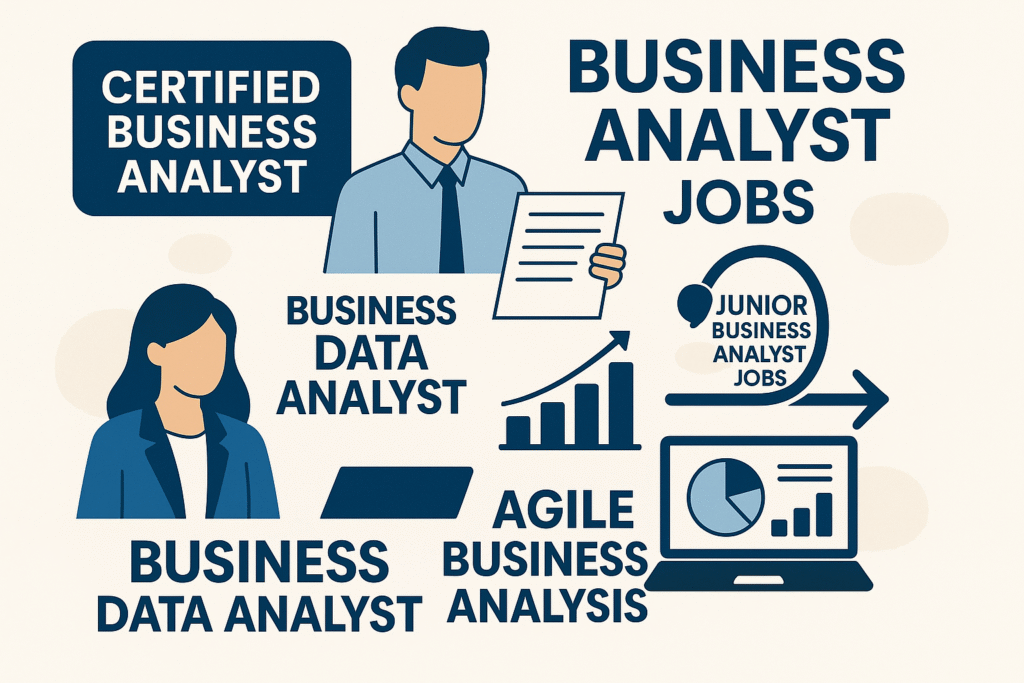In an era where data-driven decision-making and digital transformation are reshaping industries, the role of a business analyst has never been more crucial. Business analysts bridge the gap between technology and business objectives, translating needs into actionable solutions. Whether you’re aspiring to become a certified business analysis professional, exploring related roles like system analyst or business intelligence analyst, or evaluating what business analyst degrees are most valued — this comprehensive guide covers it all.
Why Choose a Career as a Business Analyst?
A business analyst helps organizations identify needs, define requirements, and implement solutions that deliver value. The demand for skilled business analysts continues to grow as businesses seek professionals who can manage change, optimize processes, and support IT initiatives.
According to recent industry surveys, the demand for business analyst roles is expected to grow by over 14% by 2030, with emerging opportunities in fields like healthcare, finance, and technology.
Core Responsibilities of a Business Analyst
- Gathering and documenting business requirements
- Performing business analysis and gap analysis
- Working with stakeholders and development teams to implement solutions
- Developing use cases, workflows, and reports
- Supporting testing and change management
To excel, a business analyst needs a combination of analytical, communication, and problem-solving skills.
Career Progression: Roles Beyond Business Analyst
While starting as a business analyst, professionals often grow into specialized or senior positions. Here are key career paths to consider:

1. System Analyst
A system analyst focuses on the technical side of business analysis. They assess IT systems, identify improvements, and ensure alignment between technology and business needs. The system analyst role is ideal for those who enjoy working closely with IT teams.
The responsibilities of a system analyst include:
- Evaluating current IT infrastructure
- Designing and specifying system changes
- Working with developers to implement solutions
2. Certified Business Analysis Professional (CBAP)
The certified business analysis professional (CBAP) certification from IIBA is one of the most respected credentials in the industry. Becoming a certified business analysis professional validates your expertise and opens doors to senior roles.
CBAP holders often take on positions like Senior BA, Lead BA, or even move into management.
3. Business Intelligence Analyst (BI Analyst)
A business intelligence analyst, or BI analyst, leverages data to provide actionable insights. If you have strong analytical and data visualization skills, transitioning into a business intelligence analyst role can be rewarding.
Key tasks of a BI analyst include:
- Creating dashboards and reports
- Analyzing trends and KPIs
- Recommending data-driven strategies
4. Business Systems Analyst
The business systems analyst is a hybrid role that combines business and technical expertise. This role involves designing and managing business-critical systems, making it perfect for those with a balance of business acumen and IT skills.
A business systems analyst often:
- Designs system workflows
- Defines system requirements
- Oversees implementation of business solutions
What Degrees Are Recommended for a Business Analyst?
While there’s no single required degree, several business analyst degrees are highly recommended for those entering the field:
- Bachelor’s in Business Administration
- Bachelor’s in Information Systems
- Bachelor’s in Economics or Finance
- Master of Business Administration (MBA)
For those targeting data-focused roles like business intelligence analyst, degrees in Data Analytics, Statistics, or Computer Science are advantageous.
A solid educational background coupled with certifications like CBAP or PMI-PBA strengthens your resume and career prospects.
Certifications Every Business Analyst Should Consider
Certifications not only validate your skills but also help you stand out in a competitive job market. Here are the top picks:
- Certified Business Analysis Professional (CBAP)
- PMI Professional in Business Analysis (PMI-PBA)
- Certified Analytics Professional (CAP) for aspiring BI analysts
- Agile Analysis Certification (IIBA-AAC)
Becoming a certified business analysis professional is often considered the gold standard.
Emerging Trends for Business Analysts in 2025
The business analyst profession is evolving to meet the needs of a digital-first world. Key trends include:
- Increased focus on data analytics and the BI analyst role
- Growing demand for business systems analysts who understand cloud and SaaS systems
- Emphasis on soft skills like stakeholder management and leadership
- Opportunities in AI, machine learning, and predictive analytics
Whether you’re aiming to become a system analyst, business intelligence analyst, or earn your stripes as a certified business analysis professional, staying ahead of trends is critical.
Tips for Aspiring Business Analysts
- Invest in Education: Earn relevant business analyst degrees and certifications.
- Gain Practical Experience: Work on projects that demonstrate your analytical and communication skills.
- Stay Current: Follow industry blogs, webinars, and join professional networks.
- Consider Specialization: Decide whether to pursue roles like system analyst, BI analyst, or business systems analyst based on your interests.
Conclusion
A career as a business analyst is both rewarding and full of opportunities. With paths leading to roles like system analyst, business intelligence analyst, business systems analyst, and the prestigious certified business analysis professional designation, there’s plenty of room for growth. Complement your journey with the right business analyst degrees, certifications, and a mindset for continuous improvement.
In 2025 and beyond, the role of the business analyst will continue to evolve, offering exciting avenues for those ready to adapt and excel.



